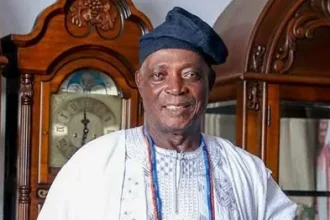The Oluwo of Iwoland, Oba Abdulrosheed Adewale Akanbi, has pushed back strongly against comments made by Justice Phillips Akinside of the Ogun State High Court regarding the responsibilities of traditional rulers to uphold customary rituals, including deity worship and burial rites.
Justice Akinside, while speaking at the fifth Chief Kehinde Sofola Memorial Bar Lecture on Wednesday, asserted that monarchs are duty-bound to observe the traditional rites of the thrones they occupy.
According to him, becoming an Oba in accordance with indigenous customs obliges one to adhere to those same customs, even in death.
He likened any deviation from such practices to “shifting the goalpost mid-game.”
However, in a scathing statement issued on Sunday, the Oluwo described the judge’s remarks as “sacrilegious” and “misleading,” accusing him of attempting to reverse the intellectual progress of the Yoruba people.
Oba Akanbi insisted that Justice Akinside’s views were based on a flawed understanding of Yoruba culture.
He argued that culture should not be confused with religion and reiterated that Yoruba monarchs are not spiritual leaders, and therefore, should not be compelled to engage in ritualistic or occult practices.
He maintained that monarchs, like every Nigerian citizen, are entitled to practice the religion of their choice, be it Islam, Christianity, or traditional belief systems, under the provisions of the Nigerian Constitution.
The Iwo king also emphasized that no law mandates traditional rulers to engage in deity worship, join secret cults, or undergo ritual practices after their demise.
He dismissed the notion that such customs are legally binding, labeling them as mere personal opinions.
In a direct attack on practices he labeled retrogressive, Oluwo condemned attempts to subject kings to occult traditions that have historically led to ritual killings.
He commended the Ogun State Government and its leading traditional rulers, the Awujale, Akarigbo, and Olu of Ilaro, for championing reforms that protect monarchs from being subjected to posthumous ritual practices.
Oba Akanbi reiterated that in Iwo, deceased kings are not subjected to mutilation, distancing such acts from what he described as mainstream Yoruba traditions.
The monarch’s full statement read, “I’m displeased reading the remark on Obaship made by a State High Court in Ogun State, Justice Phillips Akinside. His statement was not only sacrilegious but also a deliberate attempt to mislead Yorubas who have already freed themselves from the poverty of the mind.
“The judge has no deep definition of culture. Culture is not religion—Islam, Christianity and deity worshipping. Culture and traditions are not deity worshipping. Yoruba Obas are not religious leaders like Alfas, Pastors, Ogbonis, Osugbos or herbalists. And kings have the freedom to choose which of the religions to practice at will. No religion has the right to foist its practices on an Oba.
“Note that the acts of worshipping deities are not limited to the Yorubas. Igbos also worship deities, so, can’t be called our culture. I believe Justice Akinside is just passing his own opinion because there is no law supporting butchering and cutting dead kings into pieces. Kings in Nigeria are Nigerians. I’m not equally aware of any law enforcing Traditional Rulers to worship deity, belonging to secret societies and the likes. Traditional institution is not a judiciary.
“Nigerians, including kings, have the constitution guiding the conduct of everyone. In the olden days, kings wielded power autocratically. There were traditional prisons in the olden days. Justice Akinside, If you want us to go back to the past, you will not have land today, I would have snatched it. Your wife would have been snatched by the king. Kings committed many evils with impunity. I hope the judge knows the meaning of “Oba Gbesele”, meaning “Kings snatch it”. There was no coordination in those days until the enactment of the constitution guiding the conduct of everyone.
“The criteria to become a king is to be a prince and not a deity worshipper or belonging to secret societies like Osugbos, Ogboni etc. The judge must be dreaming. Every attempt to desecrate traditional rulers and the institution will continually be resisted by noble monarchs. Thank goodness the judge is not a lawmaker. A king must be freed.
“The secret clubs are purposely designed to restrict the freedom and rights of traditional rulers. Traditional rulers must resist all coordinated attempts to limit their rights. Of what justification are these occultic practices you are promoting to the destiny of our innocent children killed for rituals in Yorubaland?
“Again, I want to register my commendation to the Ogun State Government and foremost traditional rulers in Ogun—Awujale, Akarigbo, and Olu of Ilaro, for leading the campaign that eventually led to the constitutional freedom of monarchs from molestation after their death, and I hope other Yoruba states follow suit.
“In Iwo, we don’t cut monarchs into pieces after their death. Such is the practice of the Osugbos and Ogbonis, not general to the Yorubas. Responsible Monarchs are fathers to the nation who have served their people just like a compassionate president.
“The old ways are not perfect. It must be reviewed. I challenge the judge to give his children tribal marks. Fuel subsidy has been one of the banes of Nigeria’s greatness for years. President Bola Ahmed Tinubu summoned the courage and confronted the devil. The retrogressive practices of the dark age with no substantial positive influence must be reviewed. If you think you need to stay in the past, drive your children there.
“Leave kingship for kings who know the difference between occultic family practices (Oro Idile) and traditions. The statement credited to Justice Akinside is his opinion. Opinions are personal.
“One of the purposes of a meaningful existence is to correct the mistakes of the past. Traditional institution is not like a goalpost of a football. Traditional institutions are dynamic. It should be in tune with time. You can’t stay in the past and get to the future.”
Oba Akanbi’s remarks underscore a growing tension between cultural preservation and constitutional freedoms within Nigeria’s traditional leadership framework.







